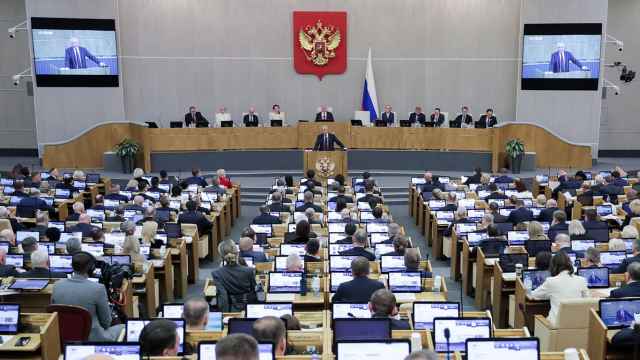The ruble was trading Wednesday above 33 rubles to the dollar, its lowest level against the greenback in almost four years, after the Russian Central Bank widened the ruble's trading corridor in the latest official move allowing the Russian currency to weaken.
Trading at more than 33 rubles to the dollar and 44 rubles to the euro Wednesday, the ruble is at its lowest level since fall 2009.
The new low was reached after the Central Bank raised the upper limit of the corridor Monday, according to a report in Vedomosti. This is the sixth time that the Central Bank has taken such a step since June, raising the upper limit by about 30 kopecks over two months.
The trading corridor for the ruble against the euro-dollar basket — against which the Central Bank sets the value of the currency — now stands at 31.95 rubles to 38.95 rubles, according to Vedomosti. The Central Bank controls the value of the ruble through interventions on the currency market.
A weaker ruble means larger profits for Russian exporters and a windfall for the state budget, which is dependent on revenue from commodity exports. Russian Finance Minister Anton Siluanov said in June that the government would be able to accept a slight weakening of the ruble if it was driven by the market.
The ruble's value in the second half of 2013 will largely depend of the volatility of the oil price, but high levels of capital outflow will put "additional pressure" on the currency, the Central Bank said in a report posted on its website Tuesday.
Russia lost $38.4 billion in capital outflow in the first six months of this year, according to official figures.
The Central Bank may move to significantly widen the ruble's corridor in the coming months, ING Bank's chief economic Dmitry Polevoi said in a research note Tuesday.
"The next big step should be a widening of the floating corridor [by, say another 1 ruble as it did in 2012] to account for deteriorated ruble fundamentals," he wrote.
A Message from The Moscow Times:
Dear readers,
We are facing unprecedented challenges. Russia's Prosecutor General's Office has designated The Moscow Times as an "undesirable" organization, criminalizing our work and putting our staff at risk of prosecution. This follows our earlier unjust labeling as a "foreign agent."
These actions are direct attempts to silence independent journalism in Russia. The authorities claim our work "discredits the decisions of the Russian leadership." We see things differently: we strive to provide accurate, unbiased reporting on Russia.
We, the journalists of The Moscow Times, refuse to be silenced. But to continue our work, we need your help.
Your support, no matter how small, makes a world of difference. If you can, please support us monthly starting from just $2. It's quick to set up, and every contribution makes a significant impact.
By supporting The Moscow Times, you're defending open, independent journalism in the face of repression. Thank you for standing with us.
Remind me later.





